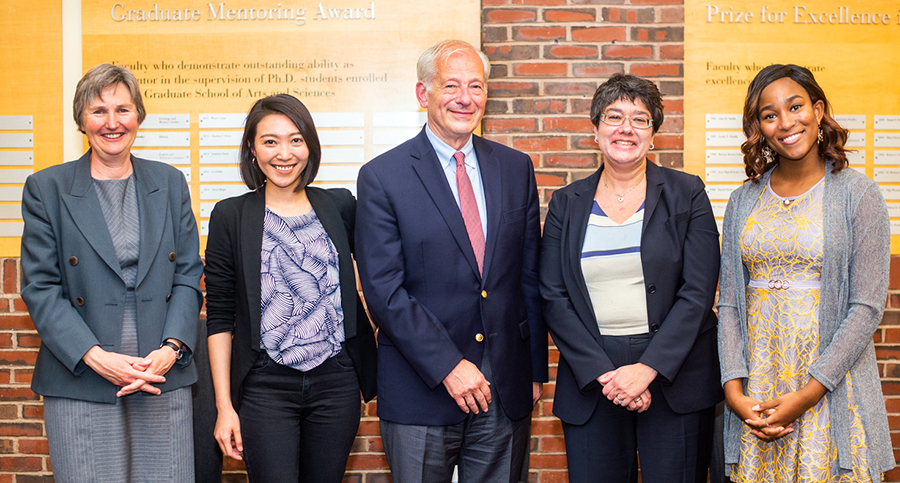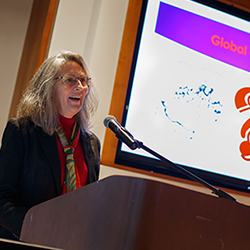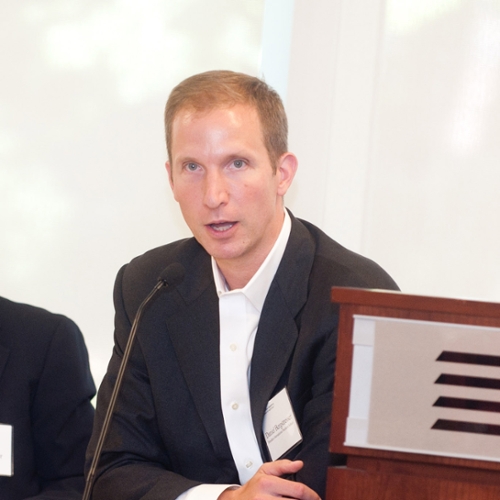
Speakers at the China Town Hall included (left to right) Dean Kathryn Graddy, Yaya Zhang, MBA’20, Professors Peter Petri and Elanah Uretsky, and Minnie Norghaisse ’19.
The budding trade war between the U.S. and China has sowed uncertainty and mistrust between the two countries, but they need each other economically and need to work toward “reciprocity,” former Secretary of State Condoleezza Rice said during “The Indispensable Relationship,” an October 9 event webcast at Brandeis and 13 other venues.
Brandeis International Business School Professor Peter Petri opened the 12th annual China Town Hall with remarks describing the recent tariffs as “just plain bad policy.” Echoing sentiments he expressed in a recent Brookings Institution article, he called the tariffs “arbitrary and discriminatory... they go against almost all the principles of the World Trade Organization,” which China joined in 2001. “Each side harms the other, but data shows that each side harms itself the most.”
Petri noted that the tariffs do have support among some in the U.S. business and policy communities as a means of pushing back on China on long-standing issues such as that country’s inadequate protection of intellectual property, its activities in the South China Sea, censorship and repression, as well as its high levels of protection on imports.
However, “tit-for-tat tariffs are not working and are counterproductive... [a trade war] is really not solving anything; it’s not even addressing the right questions and is harming relations between the countries,” Petri said. Nonetheless, the two sides are talking, and the economic relationship “is not going away,” he added.
China and the United States will continue to be “strategic competitors,” Rice said, “but competition doesn’t have to be conflictual. We need to take the venom out of the word ‘competitor.’ We can compete, but within certain rules."
“China is a mature economy at this point. We need it to succeed, and it will succeed better if it’s more open,” said Rice, who was also national security advisor from 2001–2005. “I think there’s a win-win here, but it’s going to require reciprocity.”
Rice acknowledged that “there has been some disappointment with China’s behavior” since it joined the WTO in 2001 in terms of intellectual property and keeping significant parts of its economy closed to foreign investment. “I’m a free trader. I don’t like tariffs back and forth very much; it doesn’t serve anybody. But let’s ask what is it we’re trying to achieve and see if we and China can reach that together,” she said.
“The international economy needs Chinese growth. Let’s think about how to open segments of its economy, [get cooperation] on intellectual property, and not hide behind the fact” that many of its businesses are state-owned enterprises, Rice said. “What tools does U.S. have aside from tariffs?”
Rice’s comments were followed by responses from three Brandeis students including Yaya Zhang, MBA’20, and Elanah Uretzky, a visiting professor of anthropology. Her book Occupational Hazards: Sex, Business and HIV in China discussed how “banqueting” and other rituals used to build networks in China have fueled the growth of its economy as well as its HIV epidemic.
The event was sponsored by the National Committee on U.S.-China Relations and the International Business School’s Asia Pacific Center for Economics and Business (APC). Petri will speak at another APC-sponsored event, “The Great Trade Wars of 2018: Trump, China and a Global Economy at Risk,” on Thursday, Oct. 18 at 4 p.m. in the Rapaporte Treasure Hall.
Featured Stories
News Categories
@BrandeisBusiness Instagram
View this profile on InstagramBrandeis Intl. Business School (@brandeisbusiness) • Instagram photos and videos

December 11, 2018
Mastering the art of business writing — in a foreign language
November 2, 2018
New academic chair honors founding dean
October 5, 2018
Osler cites philosophers in shaping her views on exchange rates
July 10, 2018
A professor with a passion for municipal finance